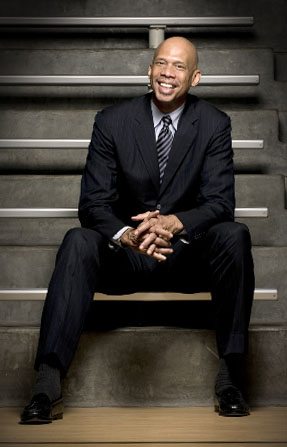St. Louis Post-Dispatch
By Kathleen Nelson
That statement would have been a shocker during his NBA career, when he built a reputation as a shy, reluctant interview. Since then, though, he has become a great communicator on multiple platforms.
First, he works closely with the Los Angeles Lakers as a special assistant, imparting to their big men the wisdom that comes with being a six-time MVP and the NBA’s all-time leading scorer. But he has an even more important message to share here Saturday. Abdul-Jabbar is a cancer survivor, and he’ll preach early detection and treatment at Illuminations 10, the annual fund-raiser for the Siteman Cancer Center at the Chase Park Plaza.
All the scoring slumps, losses, bad calls, injuries, upsets and disappointments of his 20-year NBA career pale in comparison to the shock Abdul-Jabbar received in December 2008, when he was initially diagnosed.
“When you hear the word ‘leukemia,’ you think of people dying,” Abdul-Jabbar said by phone last week. He immediately called his son, Amir, studying to be a doctor. “He said, ‘Look, you don’t know what kind you have. You have to find out what you’re dealing with and go from there.'”
Abdul-Jabbar was lucky that he was dealing with Philadelphia chromosome-positive chronic myeloid leukemia (CML), according to Dr. John DiPersio, deputy director of the Siteman Cancer Center and chief of the division of oncology at the Washington University School of Medicine. Unlike most cancers, which are triggered by a combination of gene mutations, CML is triggered by one. The good news was that one drug can control the enzyme that causes the mutation and the disease. The drawback is that patients remain on the drug for life.
“The medication does not eliminate the cancer, it suppresses it,” DiPersio said. “It’s like taking insulin for diabetes.”
Survival was Abdul-Jabbar’s initial focus, so he told only those closest to him and took an athlete’s approach to confronting the disease.
“As a competitor, you adjust what you do depending on the skills and challenges that your opponents present,” he said. “It’s the same with dealing with cancer. You have to understand it’s a new opponent and you have to do things differently to survive.”
After six weeks of treatment, his condition improved dramatically. True to his reticent public persona, he kept the diagnosis to himself for nearly a year, but he had a change of heart in November.
“As time went on, I realized I could get an important message across,” he said. “Too many people take their health for granted, don’t do the things they need to do to maintain their health: get regular checkups and screenings. It all has to do with being lazy.”
Abdul-Jabbar wasn’t lazy, largely because cancer had claimed his grandfather and uncle. When his father nearly succumbed to colon cancer, he began annual screenings.
“You have to be proactive in maintaining your health,” he said. And, he’ll say it again May 15, to anyone willing to listen.
Abdul-Jabbar has embraced all forms of media in his mission to spread the message. In addition to his website, kareemabduljabbar.com, he launched a Facebook page devoted to the disease, “Kareem Abdul-Jabbar, CML Patient and Advocate.” On the page are family photos, including shots of the young Kareem, his father, uncle and grandfather.
“It was important to show my family’s connection to cancer,” he said. “And, I just like to change things up and keep them interesting.”
Abdul-Jabbar also has found an outlet in the written word. He has written six books — one for each MVP season — and served as writer and executive producer of a documentary that will be released next year, “On the Shoulders of Giants.”
The film tells the story of the Harlem Rens, a basketball team that rose to prominence with the writers and musicians giving a voice to a generation of African-Americans. Abdul-Jabbar has filled the soundtrack with his favorite jazz and sprinkled in commentary from the Rev. Al Sharpton, Bob Costas, John Wooden, Marques Haynes, Maya Angelou and Charles Barkley.
What a far cry from his first film endeavor, “Airplane!” in which he played co-pilot Roger Murdoch, opposite Peter Graves, as Capt. Clarence Oveur.
“We have clearance, Clarence.”
“Roger, Roger.”
He laughed, not at the joke but at the arc of his cinematic journey.
“Everyone thinks that professional basketball started with the NBA in 1947. Prior to that, professional basketball had a history,” he said. “The best team at that time was the team that played in Harlem. I’m just trying to convey what that history was.”
For a 7-2 messenger with his own place in basketball history, the task doesn’t seem a tall order.
